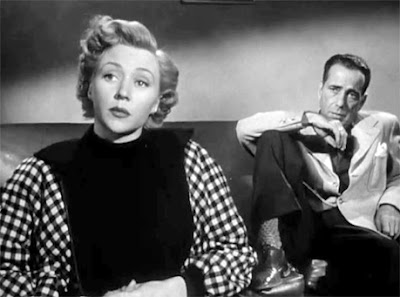This is the fourth transcript of the introductions given at CINEMA REBORN. The previous posts can be found if you click on these links.
****************************************************************************************
****************************************************************************************
Thirty years ago, I was in America when Steven Spielberg’s Saving Private Ryan opened. I went to a suburban cinema to see the first session on the first day. There were only about a dozen of us in the audience. We were all single males and all spread around a very large cinema.
Everyone else was my Dad’s age – they were Second World War veterans or perhaps men who had lost loved ones in the war.
I’ve always been interested in Second World War veterans in Film Noir.
Dixon Steele, played by Humphrey Bogart inthis film, is a Hollywood scriptwriter and a Second World War veteran.
 |
| Gloria Grahame, Humphrey Bogart, In A Lonely Place |
They were a given, so we only learn of Dix’s wartime service in a couple of throwaway lines.
In the Second World War, my father had served in Palestine, Borneo and had been attached to the US Forces in the Solomon Islands Campaign.
The war was the undoubted highpoint of Dad’s life. He had about 20 rules that ran his life and his children and we were subjected to a sort of military rule upbringing.
He remained detached and overwhelmingly judgmental all his life.
When he died, I was given his wallet and inside were a set of photographs of Dad and his army mates in the desert in Palestine.
I had never seen him look like that.
He looked alive and happy and contented.
I didn’t know this person.
He seemed like a complete stranger to me.
Dixon Steele, in In A Lonely Place says things like: “Are you going to arrest me for a lack of emotions?”
My father could have easily have said that.
I’d love to know how Dad became so trenchantly rightwing. He even found the DLP too far to the left.
After he died, my mother said to me, when I was complaining yet again about Dad’s political hatred of all things left: “You’ll probably be surprised to know that your father voted Labor all his life”.
Surprised?
Mum was always prone to understatement.
And where Dixon Steele in this film clearly enjoys goading every other character into believing he is capable of murder, so my Dad obviously enjoyed making us think he was politically rightwing when he was not.
In A Lonely Place is not a typical Film Noir. There’s no expressionistic cinematography … no hard-boiled femme fatale…
Rather, as Eddie Cockrell points out in his excellent program notes, the Noir elements live mostly inside Dix’s head.
The film is often celebrated for dismantling misogyny and while this is true of the events on-screen, it wasn’t necessarily the case with events off-screen.
At the time of production, the lead actress Gloria Grahame was married to the director Nicholas Ray.
A “Mr. and Mrs. Contract” was written between Gloria Grahame and Ray. It stipulated, and here I quote –
“my husband shall be entitled to direct, control, advise, instruct and even command my actions during the hours 9am to 6pm every day except Sunday, during the filming.
I acknowledge that in every conceivable situation his will and judgment shall be considered superior to mine and shall prevail”
Another clause forbade Grahame to:
“nag, cajole, tease, or in any feminine fashion seek to distract or influence him.”
The executive who wrote the contract claimed it: “was based on my 25-years of experience as a married man”.
In a Lonely Place.
Enjoy.
4 May 2019
Rod Bishop has had a long career in film as a critic, teacher, producer and administrator. His films include the Oz cult classic Body Melt (Dir: Philip Brophy). He is a former CEO of the Australian Film Television and Radio School and a founding member of the Organising Committee of Cinema Reborn.


No comments:
Post a Comment
Note: only a member of this blog may post a comment.